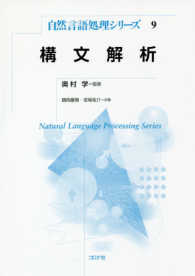- ホーム
- > 洋書
- > 英文書
- > Philosophy
Full Description
Fundamental to Islamic thought is the idea that there is a way that human beings simply are, by nature or creation. This concept is called fiṭra. Rooting her investigation in the two central passages in the Qur'an and Hadith literature, where it is asserted that God created human beings in a certain way, the author moves beyond discussion of the usual figures who have commented on those texts to look instead at a group of classical Islamic philosophers rarely discussed in conjunction with ethical matters. Tracing the development of fiṭra through this overlooked strand of medieval thinking, von Doetinchem de Rande uses fiṭra as an entrée to wider topics in Islamic ethics. She shows that the notion of fiṭra articulated by al-Farabi, Ibn Bajja, Ibn Tufayl and Ibn Rushd highlights important issues about organizational hierachies of human nature. This, she argues, has major implications for contemporary political and legal debates.
Contents
Introduction; 1. Aristotelian logic and Platonic politics: fiṭra as the seat of human dispositions and source of the first intelligibles and its implications for the division of the city in al-Fārābī; 2. The (mystical) individual and community: sociality, solitude, and the life of the exceptional philosopher in Ibn Bājja and Ibn Ṭufayl; 3. Revealed law and egalitarianism: shifting emphases in the conception and use of Fiṭra in Ibn Rushd's thought; Conclusion.






